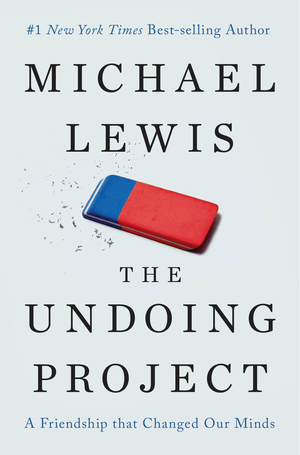 The holidays are rapidly approaching and you need some book ideas for the loved ones in your life. Below you can find a mess of new reading material including Messy: The Power of Disorder to Transform Our Lives by Tim Harford who we did a lively Q&A with last month. You can also check out the previous edition of this linkfest, or our latest monthly (October) post of the most popular books among Abnormal Returns readers. Remember anything you buy from Amazon through these links goes to support the site. Enjoy!
The holidays are rapidly approaching and you need some book ideas for the loved ones in your life. Below you can find a mess of new reading material including Messy: The Power of Disorder to Transform Our Lives by Tim Harford who we did a lively Q&A with last month. You can also check out the previous edition of this linkfest, or our latest monthly (October) post of the most popular books among Abnormal Returns readers. Remember anything you buy from Amazon through these links goes to support the site. Enjoy!
Finance
Book review: The Alan Greenspan in Sebastian Mallaby’s The Man Who Knew is “profoundly human.” (Washington Post)
Paolo Sironi’s FinTech Innovation: From Robo-advisors to Goal Based Investing and Gamification is “a compelling glimpse into this promising future.” (Reading the Markets)
Jeremy Miller looks at Warren Buffett’s early partnership letters in Warren Buffett’s Ground Rules. (Institutional Investor)
Edgar Wachenheim III’s Common Stocks & Common Sense is a “solid book for all fundamental investors focused on stock-picking.” (Reading the Markets)
Guests on Harry Stebbings’ 20 Minute VC love Ben Horowitz’s The Hard Thing About Hard Things. (Ramen Profitable)
Emrys Westacott’s The Wisdom of Frugality: Why Less Is More—More or Less asks why frugality is no longer the norm. (The Atlantic)
Despite skepticism about individual stock momentum, Gary Antonacci still recommends Wes Gray and Jack Vogel’s new book Quantitative Momentum. (Dual Momentum)
The third edition of Venture Deals: Be Smarter Than Your Lawyer and Venture Capitalist by Brad Feld and Jason Mendelson is coming and has a bunch of new content. (Brad Feld)
Hedge Fund Investing: A Practical Approach to Understanding Investor Motivation, Manager Profits, and Fund Performance by Kevin R. Mirabile is a good jumping off point for hedge fund invstors. (CFA Institute)
Adam Butler has no qualms about recommending Larry Swedroe’s new book Your Complete Guide to Factor-Based Investing. (Advisor Perspectives)
Ben Bernanke thinks Sebastian Mallaby’s biography of Alan Greenspan The Man Who Knew: The Life and Times of Alan Greenspan is “highly recommended.” (Brookings)
Lucifer’s Banker: The Untold Story of How I Destroyed Swiss Bank Secrecy by Bradley C. Birkenfeld is a “riveting book.” (Reading the Markets)
These are the top ten investing books recommended by investment masters including You Can Be a Stock Market Genius by Joel Greenblatt. (The Ways to Wealth)
Non-finance
Book notes: Weapons of Math Destruction by Cathy O’Neil is a “frightening look at the risks of the algorithms that regulate our lives..” (NYTimes)
Two books, including The Lean Startup by Eric Ries, that are more valuable than reading the 15th book on Warren Buffett. (value and opportunity)
The applicability of Robert Cialdini’s Pre-Suasion is universal and crosses disciplines. (Rational Walk)
Tim Wu author of The Attention Merchants: The Epic Struggle to Get Inside Our Heads “We have to get over our addiction to free stuff. Suck it up and pay.” (The Atlantic)
Why you can’t be your child’s best friend and more from Richard Watt’s Entitlemania: How Not to Spoil Your Kids, and What to Do If You Have by Richard Watts. (Variety)
Books that inspired Tim Harford’s Messy: The Power of Disorder to Transform Our Lives including The Everything Store: Jeff Bezos and the Age of Amazon by Brad Stone. (Tim Harford)
Lawrence Levy in To Pixar and Beyond: My Unlikely Journey With Steve Jobs to Make Entertainment History has “quite a story to tell.” (NYTimes)
Can Neuroscience Change Our Minds? by Hilary Rose and Steven Rose is “a true tour de force.” (Scientific American)
Andrew Ng recommends Zero to One by Peter Thiel and So Good They Can’t Ignore You by Cal Newport. (Farnam Street)
Diane Coyle thinks Tim Harford’s Messy: The Power of Disorder to Transform Our Lives is “..right, it’s a pleasure to read, and it’s out just in time for Christmas.” (The Enlightened Economist)
Shane Parrish recommends Jocelyn Glei’s Unsubscribe: How to Kill E-mail Anxiety, Avoid Distractions and Get Real Work Done. (Farnam Street)
Lessons learned from The Distracted Mind: Ancient Brains in a High Tech World by Adam Gazzaley and Larry D. Rosen. (NPR)
An interview with Tim Harford author of Messy: The Power of Disorder to Transform Our Lives. (Washington Post)
Vinnie Mirchandani author of Silicon Collar: An Optimistic Perspective on Humans, Machines, and Jobs is hopeful about the prospects for automation. (strategy+business)
Payoff: The Hidden Logic That Shapes Our Motivation by Dan Ariely shows that “gratitude and compliments” are better motivators than money. (FT)
Erik Vance author of Suggestible You: The Curious Science of Your Brain’s Ability to Deceive, Transform and Heal talks about how the mind powers the placebo effect. (Scientific American)
An excerpt from Michael Lewis’ forthcoming book, The Undoing Project: A Friendship That Changed Our Minds, on the partnership between Kahneman and Tversky. (Vanity Fair)
What Tim Harford, author of Messy: The Power of Disorder to Transform Our Lives, is reading including Steven Johnson’s Wonderland: How Play Made the Modern World. (Tim Harford)
Please check in with us on December 1st when we highlight the best-selling books on the site from November.








